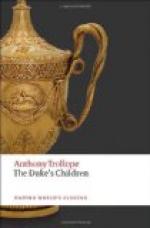And then those proposed marriages,—as to which he was beginning to know that his children would be too strong for him! Anxious as he was that both his sons should be permeated by liberal politics, studious as he had ever been to teach them that the highest duty of those high in rank was to use their authority to elevate those beneath them, still he was hardly less anxious to make them understand that their second duty required them to maintain their own position. It was by feeling this, second duty,—by feeling it and performing it,—that they would be enabled to perform the first. And now both Silverbridge and his girl were bent upon marriages by which they would depart out of their own order! Let Silverbridge marry whom he might, he could not be other than the heir to the honours of the family. But by his marriage he might either support or derogate from these honours. And now, having at first made a choice that was good, he had altered his mind from simple freak, captivated by a pair of bright eyes and an arch smile, and without a feeling in regard to his family, was anxious to take to his bosom the granddaughter of an American day-labourer!
And then his girl,—of whose beauty he was so proud, from whose manners, and tastes, and modes of life he had expected to reap those good things, in a feminine degree, which his sons as young men seemed so little fitted to give him! By slow degrees he had been brought round to acknowledge that the young man was worthy. Tregear’s conduct had been felt by the Duke to be manly. The letter he had written was a good letter. And then he had won for himself a seat in the House of Commons. When forced to speak of him to his girl he had been driven by justice to call him worthy. But how could he serve to support and strengthen the nobility, the endurance and perpetuation of which should be the peculiar care of every Palliser?
And yet as the Duke walked about his room he felt that his opposition either to the one marriage or to the other was vain. Of course they would marry according to their wills.
That same night Gerald wrote to his brother before he went to bed, as follows:
’Dear silver,—I was awfully obliged to you for sending me the I O U for that brute Percival. He only sneered when he took it, and would have said something disagreeable, but that he saw that I was in earnest. I know he did say something to Nid, only I can’t find out what. Nid is an easy-going fellow, and, as I saw, didn’t want to have a rumpus.




